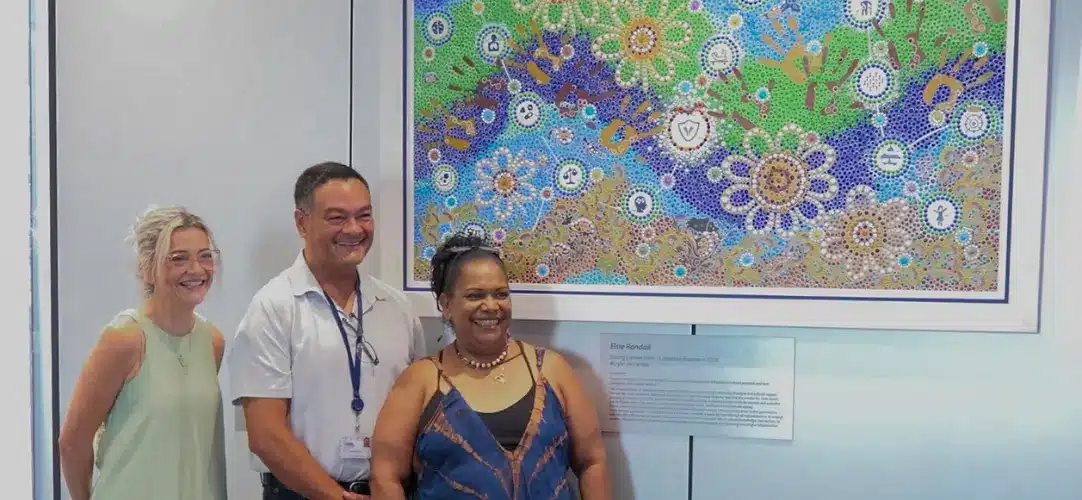
Celebrating Cultural Knowledge & Research Collaboration – HMRI unveiled Strong Connections – Collective Business, an artwork by Aboriginal Elder Elsie Randall, symbolising the integration of Aboriginal cultural wisdom into medical research.
Strengthening Aboriginal Health Research – The artwork launch aligns with HMRI’s commitment to co-designed research, prioritising Aboriginal leadership and addressing structural barriers to improve long-term health outcomes.
Commitment to Inclusion & Knowledge Sharing – HMRI is embedding Aboriginal perspectives into its research ecosystem through workforce development, culturally safe policies, and partnerships, fostering lasting change in Aboriginal health research.
Hunter Medical Research Institute (HMRI) has officially launched Strong Connections – Collective Business, a significant new artwork by esteemed Aboriginal Elder Elsie Randall. The piece, which is displayed in HMRI’s reception, represents the intersection of Aboriginal cultural knowledge and medical research, reflecting HMRI’s ongoing efforts to prioritise Aboriginal health.
The unveiling event, held at HMRI’s Yarning Circle, provided an opportunity for HMRI staff and researchers to reflect on First Nations culture and principles in medical research. The gathering celebrated community and collaboration, with cultural performances and speeches from key leaders, including HMRI CEO Professor Frances Kay-Lambkin and leading Aboriginal health researcher Professor Kelvin Kong.
A celebration of cultural knowledge and research collaboration
HMRI commissioned Strong Connections – Collective Business to honour the importance of Aboriginal wisdom in shaping medical research. The artwork, created by Elsie Randall, a proud descendant of the Bundjalung nation on her mother’s side and raised on Yaegl country through her father, reflects her deep connection to the Hunter region, where she has lived on Awabakal land for more than 35 years.
With extensive experience across welfare, justice, health, housing, and disability sectors, Elsie brings a rich cultural perspective to this transformative piece. The artwork represents the collective voice of Aboriginal men, women, elders, and youth engaging in deep listening, discussion, and culturally appropriate knowledge-sharing. The top two left meeting circles are Aboriginal men’s business, representing collective yarn-ups with HMRI, local collective voices, with the larger circle symbolising Aboriginal men and the smaller one representing Aboriginal male elders.
The bottom two meeting circles symbolise Aboriginal women’s business, again featuring collective yarn-ups with HMRI, with the larger circle for Aboriginal women and the smaller one for Aboriginal female elders. A smaller meeting circle at the bottom left represents Aboriginal youth, both male and female.
The inner circles signify ongoing yarns, deep listening, and discussion circles spanning up to five generations. These culturally appropriate spaces, endorsed by the community, provide a forum for non-Aboriginal representatives to engage with local Aboriginal people who hold strong cultural knowledge and connections.
Strengthening Aboriginal health research
The launch of Strong Connections – Collective Business aligns with HMRI’s renewed focus on Aboriginal health. As part of its 2025 approach, HMRI is prioritising co-designed research initiatives, fostering trust, and addressing structural barriers to create long-term impact.
“This work is critical to making our region, and our institute, a national and global leader in Aboriginal health and medical research,” said Professor Kelvin Kong. “By centring Aboriginal voices, wisdom, and leadership, we ensure our research is inclusive, aligned with community priorities, and delivers meaningful impact.”
As part of this commitment, HMRI is undertaking a comprehensive scoping project to guide the development of a business case addressing long-term Aboriginal health strategies. A dedicated working group, featuring Aboriginal leaders and community representatives, will oversee this initiative to ensure culturally safe and effective models for collaboration.
A lasting commitment to inclusion and knowledge sharing
“This is more than an artwork, it is a statement of commitment,” said Professor Frances Kay-Lambkin. “We recognise the need for continuous growth and are committed to fostering genuine change through respectful partnerships, meaningful action, and sustainable outcomes. Elsie’s powerful work reminds us of the importance of listening, learning, and embedding Aboriginal voices in every aspect of our research.”
The symbolic meeting circles within the artwork illustrate HMRI’s 19 research programs and invite non-Indigenous practitioners into the Aboriginal Collective Business space, where mutual learning and collaboration can thrive. It invites HMRI’s non-Indigenous practitioners to engage with local Aboriginal voices, creating culturally appropriate spaces for collaboration in medical research.
HMRI is taking concrete steps to integrate cultural knowledge into its research ecosystem. Through workforce capability building, employment pathways, and culturally safe policies, the Institute aims to become a genuine employer and research partner for Aboriginal communities.
This is an important step for HMRI,” Professor Kay-Lambkin concluded. “By incorporating Aboriginal voices and wisdom into our work, we aim to build a strong foundation for positive health outcomes. Together with our partners and communities, we aspire to enhance our role in Aboriginal health and medical research
The launch of Strong Connections – Collective Business is a significant milestone in this journey, reinforcing the power of cultural respect and collaboration in shaping a healthier future for all.
HMRI would like to acknowledge the Traditional Custodians of the land on which we work and live, the Awabakal and Worimi peoples, and pay our respects to Elders past and present. We recognise and respect their cultural heritage and beliefs and their continued connection to their land.
Hunter Medical Research Institute
We’re taking healthy further.
Locked Bag 1000
New Lambton
NSW, Australia, 2305


This site is protected by reCAPTCHA and the Google Privacy Policy and Terms of Service apply.
Copyright © 2024 Hunter Medical Research Institute | ABN: 27 081 436 919
Site by Marlin Communications
